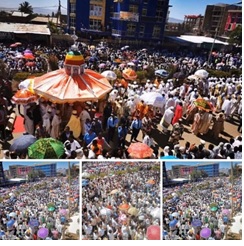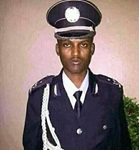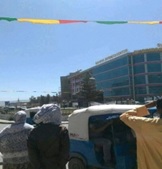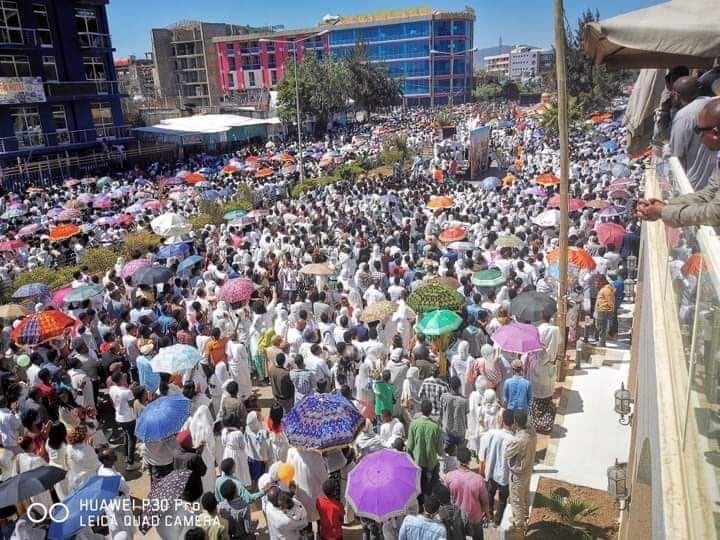By Faisal Roble
Personal notes
As I was visiting the Somali Regional State (DDS) in late December 2019, a peaceful demonstration, with the objective to show solidarity to Muslim victims and Mosques burned in the Amhara region, was conducted by Somalis in Jigjiga. The organizers rightly secured proper permits to use the City’s soccer field as a launching ground.
President Mustafa Omar supported the rally and was aware of the permit approval. By and large, it was peaceful even after middle school kids from neighboring middle schools joined the crowd and chanted “Allahu Akbar!” With these solemn words, both the police chief who gave orders to shoot and the Christian minority who were lined up in front of their business overreacted and caused unnecessary havoc on the Somali citizens.

With that, the City’s notorious police force, not to be confused with the Liyu police, and some armed Christian residents of the city aided by “Araba batana” or “crowd dispersers” attacked marchers that were largely school kids. Eventually, a 13-year old middle school Somali child who minutes ago joined the demonstration as it passed nearby his school was killed. I painfully learned later that he was a distant relative of mine. It was a matter that I later discussed with President Mustafa Omer and how the police chief mishandled the situation.
On a different event, January 19, 2020, Christian minorities in Harar, Dirdhaba, and Jigjiga organized large festivities to celebrate the Timkat holiday. Harar and Dirdhabe, both Muslim cities in the Oromia and the Somali regions, were ablaze with fire and vandalism in the hands of Amhara Christian vigilantes took place. In the case of Jigjiga, the Christian minority organized the largest march ever to have taken place.
The very same police that killed a 13-year old middle schooler only days ago, was heavily protecting the Christian minority as they overwhelmed the City.
The disparity in the way the state attacks one community and protects another is rooted in the region’s colonization, subjugation, humiliation, and othering of Somalis in their own land. Growing up in Jigjiga in the 1970s, I have lived through a culture of partiality where the state-protected Christian minority and persecuted Somalis. Such a culture is still alive in DDS. The issue here is political, cultural, and historical. In the last one hundred years, state apparatus protected only the minority Christian community. It has been so because the Somali region been and still is subservient to the settlers and their benefactors in Addis Ababa.

On the day the 13-year old child was shot, I could hear a rain of gunshots from my hotel! For a moment, I was even gravely concerned for my safety lest the gunshots were taking place within one or two blocks of my hotel. Certainly, both the police chief and the troops under his commands are trigger-happy bent on shooting to kill on sight.
The detail of how the police in Jigjiga behaves is a subject I will cover elsewhere. Suffice here to say that the President seems to have lost control over the police chief due to initial faulty decisions he made in the early days of establishing his administration. The inability to discipline the police chief or previous mishaps are having a debilitating impact on the new administration.
The disparity in treating Christian minority vs. the Somali majority reflects the heavy hand of Addis Ababa in the Somali Regional State’s affairs. Not only is this a consequence of what had happened in the region on August 4, 2018, but it is the result of one hundred years of debasement, humiliation, and subjugation of Somalis both by the state and by the settler community. Somali authority is afraid of a potential raid and a severe punishment from Addis Ababa if anything remotely like what had happened on August 4, 2018, is repeated in Jigjiga.
There is indeed a debilitating fear factor in the entire Somali region of Addis Ababa’s punitive action, and by all accounts Addis Ababa is gravely undermining the federal status of the region. In fact, the Somali region looms more like a colonial territory with extraterritorial power handed down to the non-Somali community in the region, a policy designed in past years for the protection of the settlers. Where and when did the settlers come to the SRS?
History
History not only matters but it heavily weighs on the settler-Somali relationships. In this instance, history is our enemy and a challenge to Prime Minister Abiy’s bible-based Medemer philosophy in that the settler – Somali relationship has been anything but harmonious. And here is why.
Beginning with the conquest of Somalis by Ras Mekonen at the end of the 19th Century, most Somali cities, including Jigjiga, Jinacsani, Dhagaxbuur, Qabridhahar, Godey, Luuq Ganane, and others were established as either administrative centers or military garrisons.
The region was conquered by an expeditionary army called “nefteigna” or “gun-toting militia instructed to rob, rape, and kill. As payment, the settlers were given large swaths of land to generate their livelihood. They were also encouraged to loot villages of their livestock and grain, writes Major H.C. G. Swayne in his eyewitness report of “Seventeen Trips through Somaliland and A Visit to Abyssinia. For example, the expansive farmland that sits underneath the Karamarda Mountains was gifted to one Taklehawariat after the conquest. Taklehawariat was one of the leading nefeigna hereafter “settlers” who had helped Ras Mekonen conquer Somalis and Muslim Oromo. Additionally, a significant portion of the agricultural land in Fafan region was given by Emperor Haile Selassie to Amhara nefteigna. In exchange, every nefteigna in the conquered land regardless of age, sex, or trade was expected to soldier for the defends of the new frontier.
When in early 1900 the dervish soldiers ambushed Jigjiga to push out early nefteigna settlers, the liberation army of Sayid Mohamed Abdulle Hassan encountered a never-before-seen phenomenon – that each man, women, child, civilian and non-civilian settler were armed with guns, knives, daggers to fend off. In the Amharic language, nefteigna means “armed expeditionary militia to mayhem, kill and conquer.” In the words of Major Swayne, who was a British traveler at the time of Mekonen’s conquest of Somalis, Abyssinian nefteigna were cruel in killing, raping, pillaging and burning Somali villages in the outskirts of Jigjiga. Major Swayne out of his Christian kindness appealed but in vain for help to the Victorian Court to protect “Mohamedens” and save Somalis from wanton destruction.
As part of the defense mechanism, often, both soldiers and civilian nefteigna lived either in the same military quarters or adjacent subdivisions. The settlers favored hilltop garrisons. Today, most of the settler neighborhoods are either on hilltops or on the foothills of military garrisons. They are colloquially named “xafad xabashi,” or Amhara neighborhoods.
In the 1940s, Suldan Olal Diinle, the last disciple of the Darwish resistance, vociferously attacked fortified garrisons, often located on hilltops. A similar phenomenon was observed in Kojar, Gursum, and Jinacsani in the 1940s during the Geri clan revolt. After the Geri clan successfully pushed out almost all the settlers from several garrisons, the imperial government decried about settler citizens being massacred to the tune of 700 (Sylvia Pankhurst). In a responsive letter Garad Ali Garad Dalal wrote to the magistrate in the British protectorate, he denied the accusation, writes Sylvia Pankhurst who was an aid to Emperor Haile Selassie during and after World War II.
Arming settlers is also seen in Oromo, Sidama, Afar and elsewhere. In colonized regions of Ethiopia, settlers are armed and expected to defend the frontier, whereas the indigenous are expected to farm or hard livestock thus can only carry machete and farming utensils. This unequal political landscape resembles Soweto in apartheid South Africa, Antebellum in the pre-emancipation slave-owning states of America, and Australia where the aborigines were whipped out.

Settler demography in the Somali region started with small but potently armed soldiers accompanied by cooks and prostitutes that primarily catered to them. In time, these demographic groups became diverse and exponentially grew to add to its ranks retired soldiers, small traders, service providers (shoe shiners, maids, barbers, and street vendors or “suq-badharate”). To enhance the settler numbers, in the 1970s, the state provided land and forgivable loans to former army retirees to build their own neighborhood thus the emergence of the “Duurata Safer,” or the “retire district on the outskirts of Jigjiga.
Christian residents in the Somali region are better-educated and have more employment muscle. They work in the region as government clerks, federal army members, customs and immigration officers and, in recent years, as NGO workers (drivers, assistants to ex-pats) as well as small traders. Even knowing the Amharic language gives one an undue advantage. This is what social scientists call “critical asset,” or “white privileges” that which are intangible benefits accrued as a result of belonging to the ruling side. In contemporary America, where identity politics is rife, using the concept of “critical asset” is a valuable tool to measure inequity in political, cultural, economic, and access to the state. Amharic speakers or Christian minority in the Somali region enjoy immense “critical asset.”
Since EPRDF took power, their number is boosted by a recent wave of newcomers from the South region (Dhabuub Hisbooch). As laborers, the newcomers permeated in every aspect of the region’s life, including thousands of them working as housemaids. In Los Angeles, A Third World City, Richard Riff accounts that even a lower middle-class family can afford a maid and a landscape worker only because of cheap labor from Mexico. In the same vein, most Somali families in Jigjiga employ one or two non-Somali maids and house workers due to cheap labor. However, collectively all non-Somali resident in SRS (DDS) quickly adopts a settler status and enjoys a political profile reserved for settlers in that they start speaking Amharic and vouch for an imperial philosophy. Once a non-Somali settle, the brand name of “Christian minority” covers him/her.

On January 19, 2020, Jigjiga looked like the 1970s Qulubi where thousands of Christians visited to fulfill their religious obligations. Qulubi is a Christian religious site inside eastern Oromia. Many Somalis speculate that some of the Timkat participants in Jigjiga came from as far as Gonder to fulfill their religious obligations. Conditions in Oromia is not conducive to Amhara to mount a demonstration like the one they did in Jigjiga. Whether Jigjiga becomes the new Qulubi for Christian believers remains to be seen.
Constitutional Right of the Minority in SRS
Many Somalis, however small their number is, comfortably live, work, and pass through Addis Ababa. However, no Somali can venture to live, work, or own properties in the Amhara region. Practically, no known Somali household lives in the Amhara region, unless they have camouflaged their identity.
A few months ago, a medical Somali graduate educated in Bahirdhar was rejected by the Amhara regional administration to work in any of the hospitals. It was not as if the young Somali graduate wanted to work there. However, part of his requirement to receive his medical degree included that he works a certain number of years in the federal member state where he received his degree. The administration in Gonder neither would employ him nor give him his well-deserved degree. Why? Simply put, he was a Somali in a pure Amhara state!
This is in no way to suggest that President Mustafa Omar behave as did his counterparts in Gonder. To the contrary, to the extent feasible, the Somali Regional State must accommodate non-Somali residents. But, it should do so within the constraint of the constitution, which provides rights for minorities without violating basic public welfare, safety, public morality of the host community. This provision is important given the painful history Somalis had with settlers and with the bravado-prone non-Somali minority residing in Somali Regional State.
On January 19, 2020, Christian minority’s rally in Jigjiga stirred up deep emotions. And that must be addressed without window-dressing. Somalis who have suffered under Ethiopian rule for the last one hundred years argue that the larger than life rally in Jigjiga was less religious and more political. Eyewitnesses reports allege that the Christian minority desecrated a revered Somali statue (that of Sayid Mohamed Abdulle Hassan whom British officials derogatorily called him “the mad Mullah), some spitting on the statue. It also paraded political signs, Dergi paraphernalia, and supremacist flags known to express nostalgic feelings for yesteryears painful conditions.
As such, it was a political rally camouflaged as a religious festival. If so, such action is in total contravention against the most important section of the constitution – the Preamble which says as follows:
“We, the Nations, Nationalities…. fully cognizant that our common destiny can best be served by rectifying historically unjust relationships and by further promoting our shared interests;”
Parading and proudly flaunting supremacist signs and Dergi paraphernalia as was done by the Christian minority does not get anyone closer to “shared interests.” Rather, such actions constitute serious aggravation of the very intent of this constitution’s high-value preamble, which seeks to “rectifying historical unjust” against the colonized Somalis. The Somali community has been unjustly ruled, oppressed, maimed, and raped by the state, aided and abated by the Christian settler community for the last one hundred years. Somali administration must air on the side of delivering historical justice in favor of Somalis in their own region.
Historical injustices continue in the sociopolitical map of the region. An African American author argued that the vestiges of racism in America created two unequal societies even after laws for equal rights are promulgated. Through years of inequitable distribution of political, economic and judicial power, members of the oppressing community accumulate “critical asset” by which we mean socioeconomic and political inequalities that would resist change for years to come. In that regard, the Somali community has a constitutional right to ensure that old political culture never returns to its territory.
Having said that, delivering justice for the Somalis should be done through a peaceful means and in a manner that is consistent with the constitution In that regard, there is a desperate need for establishing rules and regulations to safeguard the welfare and public safety for which the constitution provides. These laws must be promulgated both at the local and regional levels. I will suggest some laws at the end of the essay.
The minority Christian population in the Somali region does not have a benign history. As settlers, most often than not, they have assisted in the colonization project for the last one hundred years. Even so, the regional administration is required to protect their religious and other human rights as prescribed in the federal constitution.
Part One, under Human Rights, Article 14 through Article 35 of the 1995 promulgated Ethiopian constitution provides for the rights of both minorities and majority groups in any state of the Federal Republic of Ethiopia are protected. Most relevant to this discussion is Article 27, “the Right of Religion.” According to this article, “This right shall include the freedom to hold or to adopt a religion or belief of his choice, and the freedom either individually or in community with others, and in public or private, to manifest his religion or belief in worship, observance, practice, and teaching…”
However, these freedoms have limitations as stipulated in a subsequent section of the same Article: “Freedom to express or manifest one’s religion or belief may be subject only to such limitations as are prescribed by law and are necessary to protect public safety, peace, health, education, public morality or the fundamental rights and freedoms of others.” The January 19, 2020 rally by the ever-bold Christian minority not only violated public morality by desecrating the statue of Sayyid Mohamed Abdulle Hassan but has infringed on the morality of this Muslim majority region as well as threatening public safety and peace of the City.
Somali citizens have loudly complained about the proliferation of nightclubs, bars, alcohol dispensing establishments next to residential areas, public schools, mosques, and centers for Qur’an studies. The non-stop blasting of gigantic microphones in the middle of the night, often lasting as late as 2 AM at night, is also injurious to public welfare safety as well as against the morality of the majority Somali community. All these activates paraded, perpetuated, and prolonged willy-nilly by the children of yesteryear’s settlers are in total contravention to the constitution, injurious to the majority Muslim community, and therefore, create a climate for inter-ethnic conflict.
Recommendations to the Somali Regional State
1. Draft state and city level and laws to protect public welfare, safety, and morality that regulate the encroachment of certain land uses, behaviors, and practices that violate the constitutional rights and quality of life of this Muslim majority community. To that end, the SRS and its major cities must create policies that can help mitigate the said proliferation of uses into sensitive areas.
2. Draft and disseminate through local and social media all regulations that govern large-scale demonstrations and the need to establish designated areas (soccer fields, for example) as the venue(s) for such activates so that streets are not clogged and business is not subjected to unnecessary vandalism.
3. Draft a white paper for a policy discussion prior to completing the cities’ master plans of the region that may seek to limit the incoming of the new population into the region due to limitations of capacity in services such as housing, sewage, transportation, schools, and others. In other words, the SRS has a perfect right to say that it limits any new outside population moving into the region before authorities create all necessary services and infrastructure that can accommodate future growth.
4. Evaluate the current police chief who not only has been trigger-happy but rather shown a proclivity to kill and create unnecessary headache for the administration, while at the same time inadvertently contributing to the breakdown of mutual understanding between the administration and the residents of the city in that most Somalis are convinced that the police chief harshly punishes Somalis and inadvertently contributes to a perpetual disharmony.
Faisal A. Roble
Email: faisalroble19@gmail.com
———–
Faisal Roble, a writer, political analyst and a former Editor-in-Chief of WardheerNews, is mainly interested in the Horn of Africa region. He is currently the Principal Planner for the City of Los Angeles in charge of Master Planning, Economic Development and Project Implementation Division

Leave a Reply